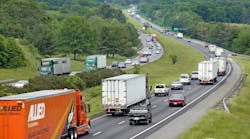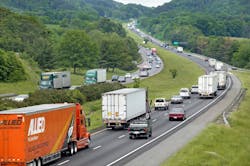Another great plan calling for “bold ideas” to repair and expand our nation’s transportation infrastructure; another great plan most likely destined to be filed away and forgotten.
Just take a look at the video Booz Allen Hamilton crafted after it orchestrated what the firm calls the first-ever “war game” simulation examining creative infrastructure initiatives and solutions to address U.S. transportation needs by the year 2040, examining ideas such as automated offshore ports and freight-only regional transportation corridors.
That’s how it always seems to go in the freight world, though: no matter how many white papers, strategic initiatives, long range plans, are floated to help revive and improve our ever-crumbling transportation network nothing ever seems to come of it.
Everyone knows the existing patchwork design of highways, railways, runways, ports, etc., is in desperate need of updating. Yet nothing ever seems to come of it. Heck we can’t even seem to get Congressional consensus on how to fund a long-term highway bill these days.
Look at the Bipartisan Policy Center's National Transportation Policy Project (NTPP) launched three years ago with the backing of such political luminaries as then-Sen. Mark Warner (D-Va.), former governor of the Old Dominion. Many of its recommendations still sadly seem to be sitting on a shelf.
[Here’s what Warner said about the the needs of the U.S. transportation system back then: sound familiar?]
Getting back to Booz Allen’s latest try at untangling the complex tangle that is the U.S. transportation world these days: in partnership with the Northwestern University Transportation Center and the Chesapeake Crescent Initiative the consulting firm held a two-day “strategic simulation” conducted simultaneously via live video feeds in: Washington, D.C.; Orlando, Florida; and Chicago, Illinois.
Mark Gerencser, executive VP with Booz Allen, in each of those locations a “diverse group” of infrastructure professionals including government, civic, and industry thought leaders developed specific regional initiatives aimed at helping solve U.S. infrastructure challenges and prepare for changes in technology expected in the next 30 years.For example, participants explored how public and private leadership could work together in “megacommunities” to find sustainable, scalable infrastructure solutions that leverage new business models, innovative technologies, and alternative financing, Gerencser (at right) said.
“To meet our nation’s infrastructure challenges by the year 2040, we need bold ideas that do more than just repair or replace failing infrastructure, but completely re-imagines it for a new generation,” he added. “We’ve been working for more than two years to engage stakeholders, conduct research, and inspire the re-imagining of America’s infrastructure.”
Some of that “re-imagining” included: Creating dedicated freight-only airports, highways and shipping corridors; off-shore automated super-ports; and elevated systems to rapidly move freight containers around specific regions of the U.S.
Is this kind of stuff expensive? Sure can be. That’s why the ideas get floated, then debated, shot down, retooled, refloated, etc. This is how change is driven forward – change that leads to improvements in efficiency that, hopefully, lowers the cost of transportation as well.
Unfortunately, I fear that despite such dedication on the part of experts like Booz Allen’s Gerencser and MANY others too countless to name, we seem doomed to stay struck in the freight planning stage for the foreseeable future.
And that’s just not a good place for freight to be.





